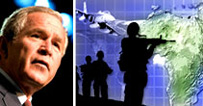By Nicole C. Lee
Guest Columnist
Updated Mar 27, 2008
 This bombing of innocent civilians in Dhoobley, Somalia is the latest in a disastrous two-year campaign of U.S. intervention in Somalia, which has further destabilized that country, the region, and resulted in the death and displacement of large numbers of the Somali population.
This bombing of innocent civilians in Dhoobley, Somalia is the latest in a disastrous two-year campaign of U.S. intervention in Somalia, which has further destabilized that country, the region, and resulted in the death and displacement of large numbers of the Somali population.On a quiet Monday morning, when all the U.S. was focused on the run up to the primaries in Texas, Ohio, Rhode Island and Vermont, the Bush administration, as part of the Global War on Terror, carried out air strikes in a small town in southern Somalia.
Despite the fact that, as one U.S. military official maintains, the U.S. military “used precision missiles to strike a known terrorist target” on a possible fugitive from the al-Qaeda terrorist network, reports from the local community leaders bear witness that three women and three children were killed, as well as 20 civilians injured.
This bombing of innocent civilians in Dhoobley, Somalia is the latest in a disastrous two-year campaign of U.S. intervention in Somalia, which has further destabilized that country, the region, and resulted in the death and displacement of large numbers of the Somali population.
Somalia has been mired in civil war since 1988. In 1991, U.S. backed dictator Mohamed Siad Barre was overthrown by a coalition of opposing clans that united to form the United Somalia Congress. Shortly after the ousting of Barre, the United Somalia Congress fell apart and Somalia was plunged into a civil war that has resulted in the death of 400,000 people and displaced another 1.5 million.
U.S. formal engagement began in 1992, under the administration of George H. W. Bush, with the airlifting of 48,000 tons of food and medical supplies to remote areas in Somalia over a six month period.
By 1993, the Clinton administration had shifted U.S. policy from delivering food supplies to nation-building. This nation-building policy was a failure that ended disastrously in the first Battle of Mogadishu, where 19 U.S. soldiers were killed and another 79 were injured.
For the next 14 years, the U.S. government’s engagement with Somalia shifted to quiet diplomacy and covert intelligence gathering until the beginning of George W. Bush’s Global War on Terror.
As part of the Global War on Terror, the U.S. government quietly poured weapons and military advisors into Ethiopia in the hopes that Ethiopia would become involved in Somalia’s civil war and help to overturn the fundamentalist Islamic government, the Islamic Courts Union. The Bush administration maintained that the Islamic Courts Union was supported by al-Qaeda.
In July 2006, a few thousand heavily armed and U.S. trained Ethiopian troops invaded Somalia and opened a new front in the Bush administration’s war on terrorism. This intervention by Ethiopia is considered by many to be illegal and immoral, as well as highly controversial in Ethiopia where the Meles government has become increasingly repressive.
And while the Ethiopian government had reasons of its own for intervening in Somalia’s civil war, there can be no doubt that Ethiopia’s actions were largely done on behalf of the United States.
The U.S. government has never publicly taken responsibility for its role in further destabilizing Somalia and the Horn of Africa region, which also includes Eritrea and Djibouti.
The Bush administration has admitted that the U.S. and Ethiopian militaries have “a close working relationship,” which includes intelligence sharing, arms aid and training that gives the Ethiopians “the capacity to defend their borders and intercept terrorists and weapons of mass destruction.”
By January 2007, within six months of Ethiopia’s invasion of Somalia, the United States began to conduct air strikes in southern Somalia against suspected al- Qaeda targets and members of the Islamic government as part of the Global War on Terror. Those January 2007 air strikes, similar to the March 3 bombing, were confirmed by U.S. officials as a failure. Now, almost one year later the Bush administration is reengaging in this failed tactic.
The early March attack is proof that the Global War on Terror and the increased U.S. military presence on the African continent has created a theatre of war that moves beyond traditional battlefields, and into the living rooms of the innocent.
For the 80,000 Somalis and Somali-Americans living in Minneapolis, Columbus, Ohio, Washington, D.C., Seattle and Atlanta, the question remains: Why does their government and the U.S. government continue to act in ways that terrorize families in Somalia under the guise of fighting terror? That is a question that we, as American citizens, have to also ask.
Nicole C. Lee is the executive director of TransAfrica Forum. This commentary was distributed by NNPA.
www.finalcall.com

















1 comment:
dg83b08v
golden goose outlet
golden goose outlet
golden goose outlet
golden goose outlet
supreme outlet
golden goose outlet
golden goose outlet
golden goose outlet
golden goose outlet
golden goose outlet
Post a Comment